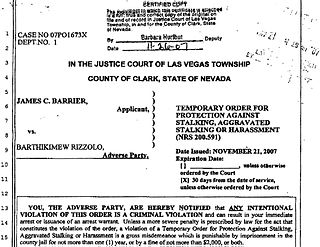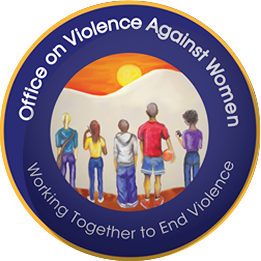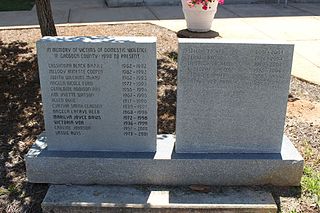Related Research Articles

A restraining order or protective order, is an order used by a court to protect a person in a situation often involving alleged domestic violence, child abuse, assault, harassment, stalking, or sexual assault.

Dame Vera Baird is a British barrister and politician who has held roles as a government minister, police and crime commissioner, and Victims' Commissioner for England and Wales.
Abuse is the improper usage or treatment of a person or thing, often to unfairly or improperly gain benefit. Abuse can come in many forms, such as: physical or verbal maltreatment, injury, assault, violation, rape, unjust practices, crimes, or other types of aggression. To these descriptions, one can also add the Kantian notion of the wrongness of using another human being as means to an end rather than as ends in themselves. Some sources describe abuse as "socially constructed", which means there may be more or less recognition of the suffering of a victim at different times and societies.

The Unborn Victims of Violence Act of 2004 is a United States law that recognizes an embryo or fetus in utero as a legal victim, if they are injured or killed during the commission of any of over 60 listed federal crimes of violence. The law defines "child in utero" as "a member of the species Homo sapiens, at any stage of development, who is carried in the womb."
The Senate Judiciary Subcommittee on Criminal Justice and Counterterrorism is one of six subcommittees within the Senate Judiciary Committee. It was previously known as the Subcommittee on Crime and Terrorism

The Violence Against Women Act of 1994 (VAWA) is a United States federal law signed by President Bill Clinton on September 13, 1994. The Act provided $1.6 billion toward investigation and the prosecution of violent crimes against women, imposed automatic and mandatory restitution on those convicted, and allowed civil redress when prosecutors chose to not prosecute cases. The Act also established the Office on Violence Against Women within the U.S. Department of Justice.

The United States Office on Violence Against Women (OVW) was created following the Violence Against Women Act (VAWA) of 1994. The Act was renewed in 2005, 2013 and again in 2022. The Violence Against Women Act legislation requires the Office on Violence Against Women to work to respond to and reduce violence against women in many different areas, including on college campuses and in people's homes. VAWA requires Office on Violence Against Women to administer justice and strengthen services for victims of domestic violence, dating violence, sexual assault, and stalking.
Dorchen A. Leidholdt is an activist and leader in the feminist movement against violence against women. Since the mid-1970s, she has counseled and advocated for rape victims, organized against "the media's promotion of violence against women", served on the legal team for the plaintiff in a precedent-setting sexual harassment case, founded an international non-governmental organization fighting prostitution and trafficking in women and children, directed the nation's largest legal services program for victims of domestic violence, advocated for the enactment and implementation of laws that further the rights of abused women, and represented hundreds of women victimized by intimate partner violence, human trafficking, sexual assault, the threat of honor killing, female genital mutilation, forced and child marriage, and the internet bride trade.
Hate crime laws in the United States are state and federal laws intended to protect against hate crimes. While state laws vary, current statutes permit federal prosecution of hate crimes committed on the basis of a person's characteristics of race, religion, ethnicity, disability, nationality, gender, sexual orientation, and/or gender identity. The U.S. Department of Justice (DOJ), Federal Bureau of Investigation (FBI), and campus police departments are required to collect and publish hate crime statistics.

The National Network to End Domestic Violence(NNEDV) is a 501(c)(3) not-for-profit organization founded in 1990, based in the District of Columbia. It is a network of state and territorial domestic violence coalitions, representing over 2,000 member organizations nationwide. The National Network to End Domestic Violence works to address the many aspects of domestic violence.

Domestic violence is violence or other abuse that occurs in a domestic setting, such as in a marriage or cohabitation. Domestic violence is often used as a synonym for intimate partner violence, which is committed by one of the people in an intimate relationship against the other person, and can take place in relationships or between former spouses or partners. In its broadest sense, domestic violence also involves violence against children, parents, or the elderly. It can assume multiple forms, including physical, verbal, emotional, economic, religious, reproductive, financial abuse, or sexual abuse, or combinations of these. It can range from subtle, coercive forms to marital rape and other violent physical abuse, such as choking, beating, female genital mutilation, and acid throwing that may result in disfigurement or death, and includes the use of technology to harass, control, monitor, stalk or hack. Domestic murder includes stoning, bride burning, honor killing, and dowry death, which sometimes involves non-cohabitating family members. In 2015, the United Kingdom's Home Office widened the definition of domestic violence to include coercive control.
Specialized domestic violence courts are designed to improve victim safety and enhance defendant accountability. There is no one set definition of a specialized violence court, although these types of courts can be either civil or criminal and typically hear the majority of an area's domestic violence cases on a separate calendar. Additionally, these courts are typically led by specially assigned judges who can make more informed and consistent decisions based on their expertise and experience with the unique legal and personal issues in domestic violence cases.

The Pennsylvania Coalition to Advance Respect (PCAR), known as the Pennsylvania Coalition Against Rape from 1975 to 2023, is an organization that opposes rape and sexual violence in Pennsylvania and the United States, and advocates for victims of sexual violence.

Domestic violence is a form of violence that occurs within a domestic relationship. Although domestic violence often occurs between partners in the context of an intimate relationship, it may also describe other household violence, such as violence against a child, by a child against a parent or violence between siblings in the same household. In the United States, it is recognized as an important social problem by governmental and non-governmental agencies, and various Violence Against Women Acts have been passed by the US Congress in an attempt to stem this tide.
The following outline is provided as an overview of and topical guide to domestic violence:
Lenore Edna Walker is an American psychologist who founded the Domestic Violence Institute, documented the cycle of abuse and wrote The Battered Woman, published in 1979, for which she won the Distinguished Media Award that year. She was inducted into the Colorado Women's Hall of Fame in 1987.

Lois Galgay Reckitt was an American feminist and activist. Called "one of the most prominent advocates in Maine for abused women", she served as executive director of Family Crisis Services in Portland, Maine, for more than three decades.
Deborah D. Tucker is an American activist and executive who founded the first shelter in the United States for victims of domestic violence and their children. In 2014, she was inducted into the Texas Women's Hall of Fame.
The boyfriend loophole is a gap in American gun legislation that allows physically abusive ex-romantic partners and stalkers with previous convictions or restraining orders to access guns. While individuals who have been convicted of, or are under a restraining order for, domestic violence are prohibited from owning a firearm, the prohibition only applies if the victim was the perpetrator's spouse or cohabitant, or if the perpetrator had a child with the victim.
Hagir S. Elsheikh is a Sudanese-American Human Rights/Woman's Rights activist, Serial Entrepreneur, Talk show Host, Producer Author & Philanthropist. She is the Chairwoman/CEO of Hagir Network, Owner/CEO of HSE Staffing Agency LLC, Founder/President of Kareem’s Mission organization, and KMission TV LLC. Founder/CEO Tomorrow Smiles Organization, motivational speaker and political analyst.
References
- ↑ Wlazelek, Ann (November 30, 1984). Judicial system can hurt crime victims, speaker says. The Morning Call
- ↑ Maschke, Karen J. (1999). The Legal Response to Violence Against Women. Taylor & Francis, ISBN 9780815325192
- ↑ DeJesus, Ivey. "Claims of 'Bullying', 'Intimidation' Aimed at Coalition Created to Fight for Domestic Violence". Penn Live. PA Media Group. Retrieved 2 April 2019.
- ↑ "Susan Kelly-Dreiss". National Women's Hall of Fame. National Women's Hall of Fame. Retrieved 17 April 2019.
- ↑ "Women and Violence" (PDF). Hearings Before The Committee On The Judiciary. 101 (80): 133. 11 December 1990. Retrieved 2 April 2019.
- ↑ "Kelly-Dreiss, Susan - National Women's Hall of Fame" . Retrieved 2015-09-30.